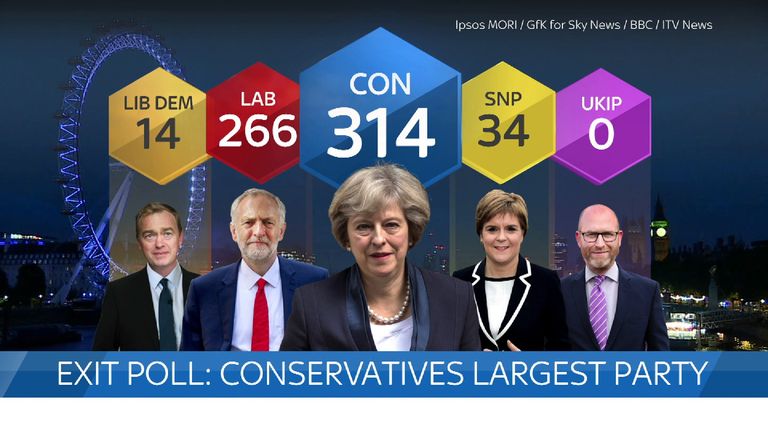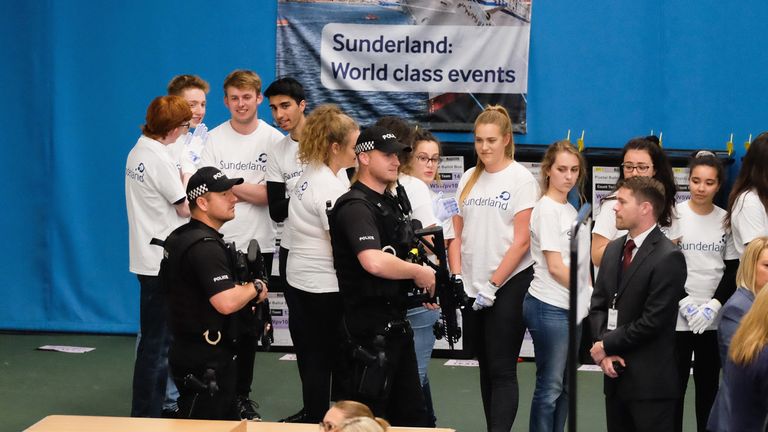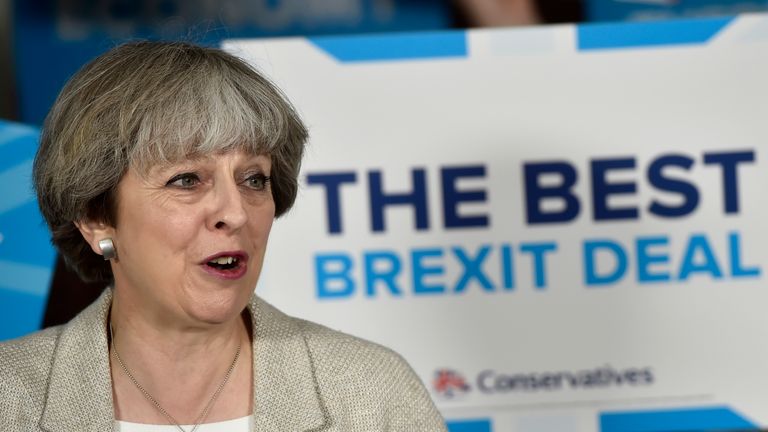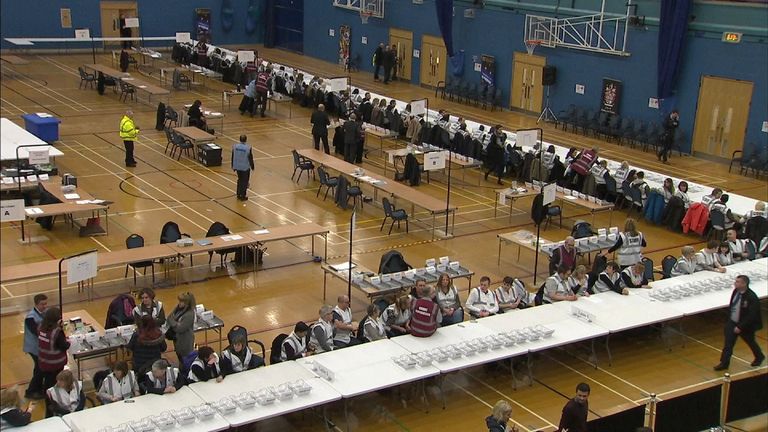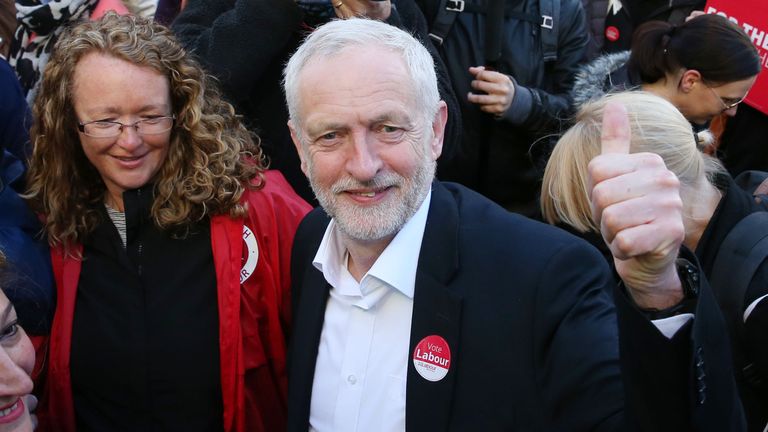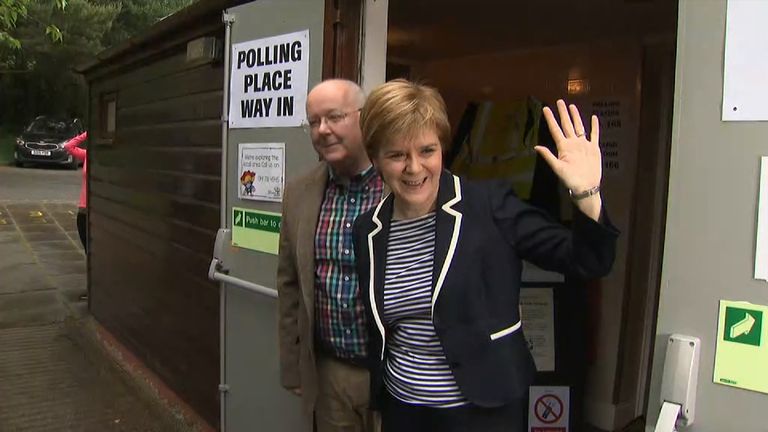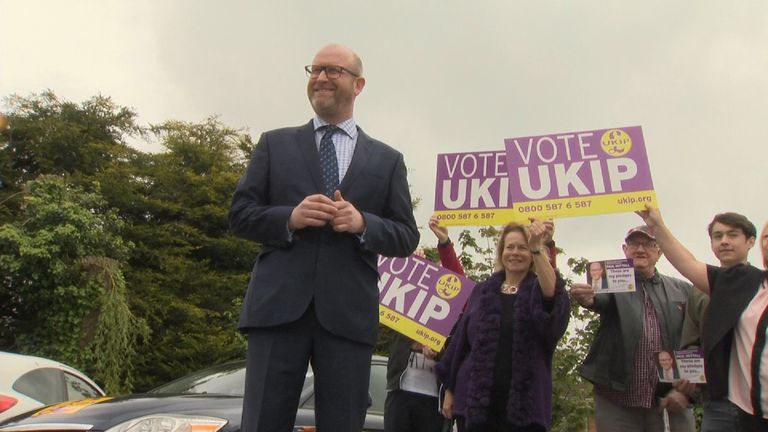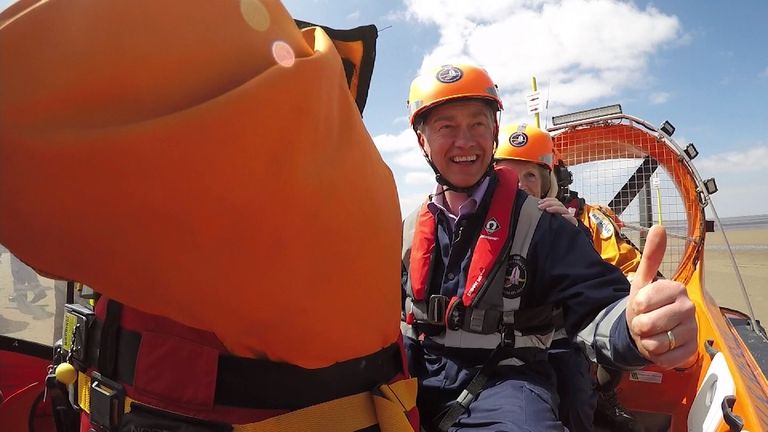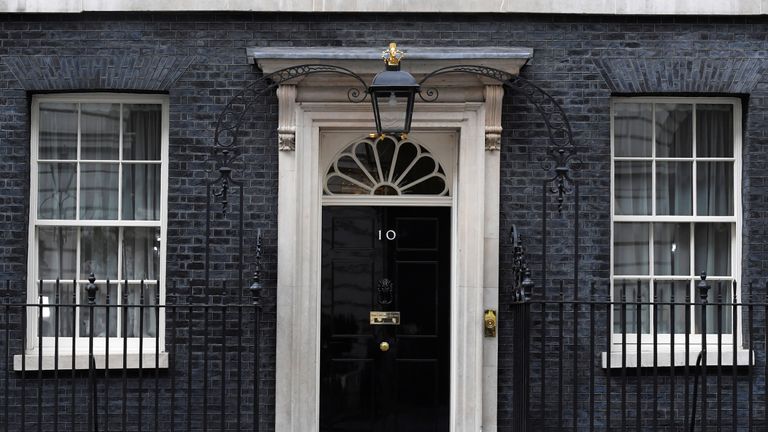Key General Election results as they happen
Sky News is keeping track of the big moments and major results as the country's next government is revealed.
Friday 9 June 2017 12:15, UK
Whether it's crunching the numbers as the results come in, analysing voting trends, taking the key players to task or providing a real-time picture of the make-up of the country, Sky News has got election night covered.
Here are the key moments so far (and we'll update these throughout the night):
:: 10pm - Polls have closed
Counting in the 2017 General Election is under way.
The exit poll shows the Conservatives projected to win 314 seats, making them the largest party but without enough for a majority in the Commons (they need 326). Labour would be on 266 seats, the SNP 34 seats and the Lib Dems on 14 seats. UKIP would have no seats.
::
:: 11pm - The first constituency has declared
Newcastle Upon Tyne Central is the first to declare this year. Labour candidate Chi Onwurah has held the seat with a majority of just under 15,000. Turnout was 66.8%.
Houghton and Sunderland South was close behind, and the seat was held by Labour's Bridget Phillipson. Turnout was 61%, up from 56.3% in 2015.
Sunderland Central came in third and was held by Labour's Julie Elliott with 25,056 votes, a majority of just under 10,000. Turnout was 62%.
:: 12am - The early results
The Conservatives got their first seat just before 12am - Swindon North was held by Justin Tomlinson with 29,431 votes, a majority over Labour of 8,335. Turnout was 68.5%.
The Conservatives held Nuneaton, with Marcus Jones gaining a majority of 4,739 over the Labour candidate Philip Johnson.
Nuneaton, in Warwickshire, is seen as a bellwether seat, having flipped between Conservative and Labour but the Tories had a 4,882 majority in 2015. The then prime minister David Cameron said he knew he had won when his party held Nuneaton.
:: 1am - First marginal seat declares
Labour held Wrexham, a seat where they had a majority of just 1,831 in 2015. They have increased their majority by just one vote. The Conservatives failed to get the 2.8% swing needed to win it.
:: 1.15am
Labour's first gain of the night was in Scotland, where it won Rutherglen and Hamilton West from the SNP. Ged Killen's majority is 265.
The first result from London was Tooting, which was held comfortably by Labour.
:: 1.30am
West Bromwich East, Labour deputy leader Tom Watson holds his seat with a majority of 7,713. He says the election "looks likely to be a very, very bad result for Theresa May".
:: 1.40am
Labour had its second gain of the night, taking the north Wales seat of Vale of Clwyd. The Conservatives won it by just 237 votes in 2015, making it a key Labour target. Labour won it by 2,379.
The Conservatives have gained Angus in Scotland from the SNP with a majority of 2,644 - a swing of 16.2% to the Tories.
:: 2am - Declarations are beginning to pile up
Labour took the London seat of Battersea, with Marsha de Cordova winning 25,292 votes over the Conservative Party's Jane Ellison, who got 22,876 votes.
Labour took Bury North from the Conservatives. James Frith won 25,683 votes over David Nuttall's 21,308.
Labour held Wolverhampton SW, where they had a small majority of 801 in 2015.
The Conservatives gained Ochil and Perthshire South from the SNP. They also gained Southport from the Liberal Democrats. The Lib Dems had a majority of 1,322 in the 2015 election.
SNP Westminster leader Angus Robertson lost his seat of Moray to Conservative Douglas Ross. Mr Ross won with a majority of 4,159 votes. The SNP also lost Midlothian - to Labour by 885 votes.
:: 2.30am
Former Liberal Democrat leader Nick Clegg lost his Sheffield Hallam seat to Labour's Jared O Mara. Mr Clegg got 19,756 votes to Mr O Mara's 21,881. Mr Clegg said the future Parliament will face the "excruciating" task of trying to assemble a "sensible government" and will be "presiding over a deeply deeply polarised nation".
"We must try to find common ground if we are to heal those profound divisions," he adds.
Business Secretary Greg Clark held the seat of Tunbridge Wells and Foreign Secretary Boris Johnson also held Uxbridge and Ruislip South (despite a swing to labour of 13.6%).
Sir Vince Cable won Twickenham with a majority of 9,752 - a swing of 14.7%.
Ed Miliband won Doncaster North.
In Northern Ireland, Sinn Fein gained Foyle from the SDLP.
The SNP's John Nicolson lost East Dunbartonshire to Liberal Democrat Jo Swinson, who got a majority of 5,339.
:: 3am - May and Corbyn hold their seats
Conservative leader Theresa May held the Berkshire seat of Maidenhead, with 37,718 votes against Labour's Pat McDonald (11,261 votes). Mrs May has held the seat since it was created in 1997. She will have a good idea about whether she is still Prime Minister by now.
Labour leader Jeremy Corbyn held his London seat of Islington North with 40,086 votes, a massive majority over the next best candidate James Clark from the Conservatives (6871 votes). Mr Corbyn has held the seat since 1983.
Liberal Democrat leader Tim Farron held his Westmorland and Lonsdale seat.
The Conservatives gained Clacton from UKIP, with Giles Watling winning a majority of 15,828.
The Liberal Democrats gained Bath from the Conservatives.
Labour gained Kirkcaldy from the SNP and Bedford from the Conservatives. Labour gained Portsmouth South from the Conservatives.
:: 3.30am - Nuttall loses his seat
UKIP leader Paul Nuttall failed to win the seat of Boston and Skegness, coming third behind the Conservatives and Labour.
The Lib Dems gained Caithness from the SNP and Eastbourne from the Conservatives.
Labour's Kate Hoey held the London seat of Vauxhall with a majority of 20,250.
Labour won Croydon Central from the Conservatives by 5,652 votes, overtaking the previous Tory majority of 165. Labour also took Derby North, Peterborough and Plymouth Sutton & Devonport from the Conservatives
Labour gained the Welsh seat Gower from the Conservatives. Tonia Antoniazzi won 49.9%, ahead of the 42.7% won by the Conservative Byron Davies. Gower had the smallest majority for the Conservatives after the 2015 election - just 27 votes.
:: 4am - Alex Salmond is out
Former SNP leader Alex Salmond has lost his seat of Gordon to the Conservatives' Colin Clark, who gained a majority of 2,607.
The Conservatives have taken Berwickshire, Roxburgh and Selkirk from the SNP. John Lamont gained 53.9% of the vote over the SNP's 32.8%. The SNP had a majority of just 328 after the 2015 election.
Labour has held the City of Chester, with Chris Matheson winning 56.8% of the vote. This was Labour's most marginal seat after the 2015 election - the majority was just 93 votes. Labour has also held Cambridge, extending their 2015 majority of 599 votes to 12,661 this year.
The Conservatives have gained Walsall North from Labour, with Conservative Eddie Hughes winning 49.6% of the vote. They also marginally held the seats of Thurrock and Telford by 345 and 720 votes respectively.
:: 4.45am
Labour has gained Brighton Kemptown from the Conservatives with 28,703 votes to 18,835 - a turnaround from 2015, when the seat went to the Tories with a majority of just 690.
:: 5am - Amber Rudd keeps her seat
After a recount in the seat of Hastings & Rye, Home Secretary Amber Rudd has narrowly won with a majority of just 346.
The Lib Dems gained Oxford West and Abingdon from the Conservatives.
:: 5.30am
Newcastle under Lyme had a Labour majority of 650 in 2015 and is currently too close to call.
:: 6am
It is now confirmed that there will be a hung parliament.
:: 7.10am
Zac Goldsmith, who left the Tory party over Heathrow expansion last autumn, has retaken Richmond Park for the Conservatives from the Lib Dem's Sarah Olney with a majority of just 45.
Concession?
Traditionally, the winning party leader waits until the loser concedes before declaring victory.
That concession can come any time, but the leader of the losing party will often head back to party HQ first. In his resignation speech after losing in 2015, the then Labour chief Ed Miliband revealed he had called Mr Cameron to concede defeat.
Candidates
A total of 3,306 candidates stood in the 2017 General Election - fewer than any election since 1992.
In 2015, there were 3,971.
The most significant reduction this year is the number of UKIP (down 246) and Green Party (down 105) candidates.
A record 983 women candidates also stood this year - up from 947 in 2015, when a record 191 women were elected to Parliament.
The larger number of female candidates was partly down to the selection process, which has been more controlled by the main parties than in previous years, but also because of the short amount of time to select candidates.
Labour leads the way with 256 female candidates, up 43 from 2015. The Conservatives have 182 - up 14 - and the Lib Dems are up 20 with 184 female candidates this year.
